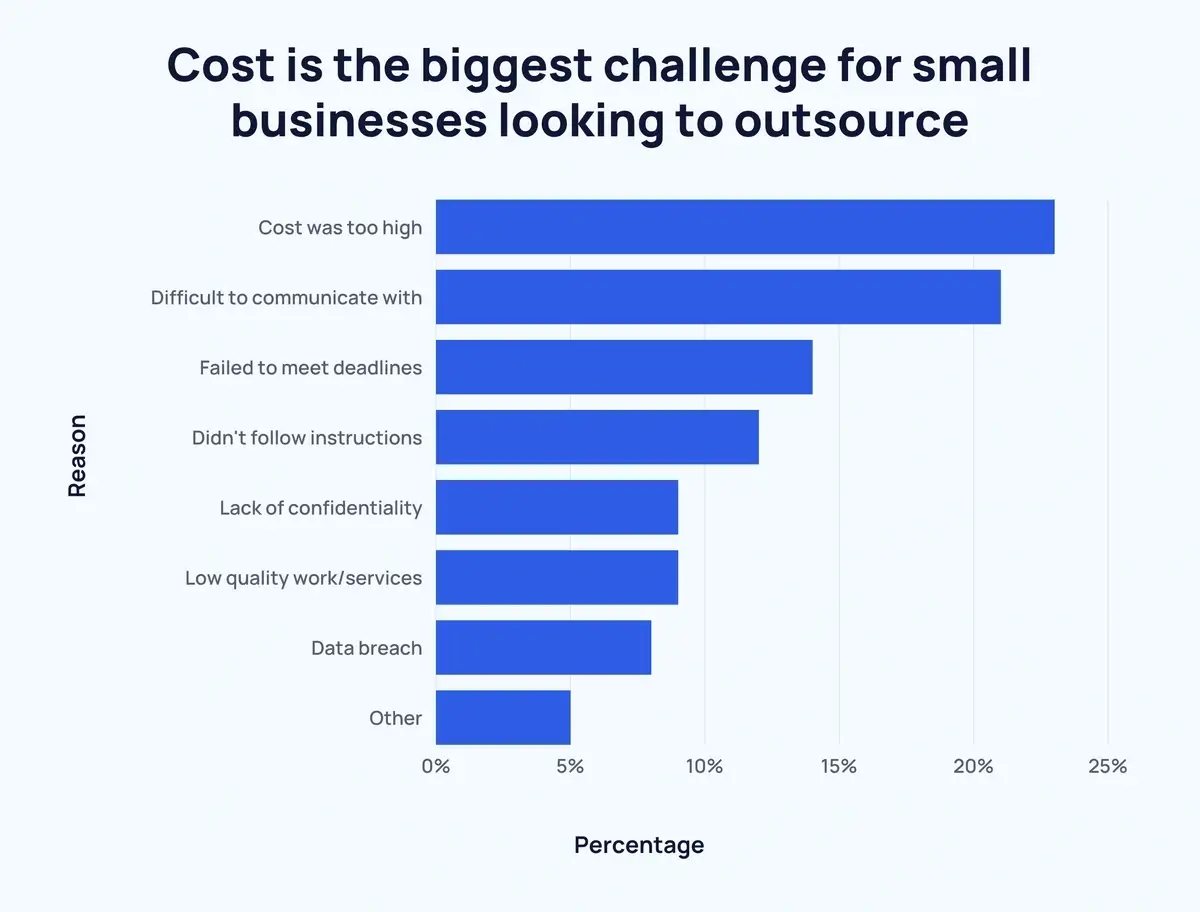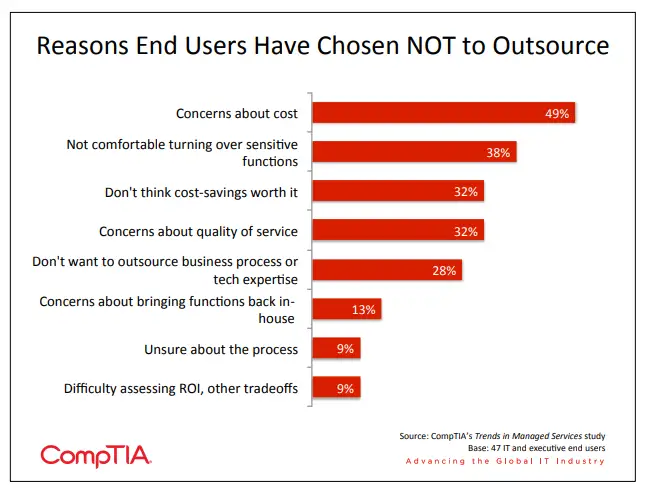Managing a company’s IT needs can often feel like navigating a minefield. With technology constantly evolving and the need to stay ahead of competitors, businesses are frequently faced with a critical decision: Should they handle IT in-house or outsource?
| As Nahjee Maybin, CEO of Kenyatta Computer Services says, “This choice must not be taken lightly, as it impacts not just the financial health but also the operational efficiency of your company.” |
According to a report by Clutch, approximately 39% of companies now outsource at least some of their IT functions, underscoring the growing reliance on external providers to meet technological needs.
This illustrates the widespread adoption of IT outsourcing as a strategy to enhance efficiency, reduce costs, and stay competitive in a rapidly evolving digital landscape.
IT outsourcing has emerged as a viable solution for many, yet it carries a mix of benefits and risks that must be carefully weighed.
Top 6 Advantages of Outsourcing IT Services
1. Cost Reduction and Savings
59% of companies outsource to cut costs. By outsourcing, companies can reduce their operational costs and save money on labor costs. This shift allows for the allocation of resources to other critical areas, fostering growth and innovation.
Additionally, outsourcing can lead to cost predictability, with fixed monthly expenses replacing variable costs. It also eliminates the need for large capital expenditures in IT infrastructure, freeing up capital for other business investments.

Source: ExplodingTopics
2. Focus on Core Business Functions
65% of companies that utilize outsourcing report that the most significant benefit is the ability to concentrate on core business functions.
By entrusting technical tasks to an outsourcing team, companies can concentrate on strategic goals without the distraction of managing a complex IT infrastructure.
This approach not only boosts productivity but also accelerates business growth by allowing firms to deploy resources more strategically. It enhances agility, enabling businesses to respond more quickly to market changes and opportunities.
3. Access to Global Talent and Competitive Advantage
Another key benefit of IT outsourcing is access to a global talent pool. Outsourcing offers companies the opportunity to work with experts worldwide, bringing in fresh perspectives and skills. This advantage can translate into a competitive edge in the market, as businesses can leverage top-notch expertise without the high costs associated with hiring in-house.
It also facilitates round-the-clock operations, enabling faster project turnaround times. Businesses benefit from diverse cultural insights, which can improve product development and customer service strategies.
Struggling with IT Management?
Transition to ease with Kenyatta’s comprehensive IT management solutions.
4. Flexibility and Scalability
IT outsourcing provides businesses with the flexibility to scale their IT operations up or down based on demand. This adaptability is crucial in today’s dynamic business environment, where needs can change rapidly.
It allows companies to quickly adapt to market demands without the burden of hiring or laying off staff. Moreover, scalability ensures that IT capabilities can grow in tandem with the business, supporting expansion into new markets or regions without the logistical challenges of setting up local IT departments.
5. Continuous Support and Monitoring
One significant benefit of IT outsourcing is the availability of continuous support and monitoring services. Many IT outsourcing companies offer 24/7 support, ensuring that any issues can be addressed promptly, regardless of the time of day.
This round-the-clock support can significantly reduce downtime and ensure that IT systems are always running smoothly, which is crucial for businesses that rely heavily on their digital infrastructure.
6. Risk Management and Compliance
Outsourcing IT services can also improve a company’s risk management and compliance posture. IT service providers are typically well-versed in the latest regulations and standards related to cybersecurity, data protection, and industry-specific compliance requirements.
By leveraging their expertise, companies can ensure that they adhere to legal standards and industry best practices, reducing the risk of costly violations.
Top 6 Disadvantages of Outsourcing IT Services
1. Loss of Control
One of the main concerns with IT outsourcing is the potential loss of control over IT functions. Relying on an external provider can lead to challenges in maintaining the quality and timeliness of services.
This perceived loss of control can be mitigated through detailed service level agreements (SLAs) and regular performance reviews. However, companies must carefully select partners that align with their business values and operational standards to minimize this risk.
2. Security and Confidentiality Risks
Outsourcing IT services can also pose risks to security and confidentiality. Companies must ensure that the outsourcing company has robust security measures in place to protect sensitive data and intellectual property.
It is critical to select a provider with a strong track record in security and compliance. Regular security audits and compliance checks can help maintain high levels of data protection and confidentiality.
3. Dependency on the Outsourcing Company
Becoming too dependent on an external provider can be risky if the outsourcing company fails to deliver as expected. This dependency can impact the business’s ability to operate smoothly and respond to market changes.
To reduce this risk, businesses should diversify their outsourcing partnerships and develop contingency plans. Establishing clear communication channels and having contractual safeguards in place can also help manage dependency issues.
4. Integration Challenges
Outsourcing IT functions can sometimes lead to challenges in integrating the outsourced services with existing in-house processes and systems.
Differences in technologies, methodologies, and standards can create compatibility issues, making seamless integration difficult to achieve. This lack of integration can hinder the efficiency and effectiveness of both outsourced and in-house operations, requiring careful planning and coordination to mitigate.

Source: CompTIA
5. Time Zone and Cultural Differences
Another risk associated with IT outsourcing, especially when services are outsourced to providers in different countries, is the challenge posed by time zones and cultural differences.
These differences can affect not only the work schedule but also communication and the understanding of project requirements and business expectations. Managing these differences requires effective communication strategies and potentially flexible working hours to ensure alignment and timely delivery of services.
| More resources you might like: |
6. Quality Variations
While outsourcing can bring in expertise, there can be variations in the quality of work, depending on the service provider chosen. Not all outsourcing companies have the same standards for quality control, which can lead to inconsistencies in the services received.
This variation can affect the overall quality of IT functions and services within a company, making the selection of a reliable outsourcing partner critical.
Key Factors To Consider When Choosing Between In-House IT Management and IT Outsourcing
| Factor | In-House IT Management | IT Outsourcing |
| Cost Implications | Higher upfront and ongoing costs due to salaries, training, and infrastructure. | Reduced initial costs and predictable monthly expenses. |
| Expertise and Skills | Limited to the in-house team’s knowledge and skills. Continuous training required. | Access to a wide range of global expertise and specialized skills. |
| Scalability | Scaling up requires significant investment in recruitment and infrastructure. | Easily scalable with flexible service agreements to meet changing demands. |
| Innovation Potential | Innovation pace can be slower due to resource constraints. | Faster innovation with access to the latest technologies and practices. |
| Control and Oversight | Direct control over processes and decision-making. | Control is shared with or delegated to the outsourcing partner. |
| Risk Management | Full responsibility for security, compliance, and risk management. | Outsourcing partners often bring advanced risk management strategies and compliance expertise. |
| Operational Flexibility | Changes in operation scale or scope can be challenging and slow. | High flexibility to adapt to market changes or shifts in strategy. |
| Technology Investments | Requires significant capital investment in technology and infrastructure. | Reduced need for heavy technology investments, with costs often covered by the service provider. |
Experience the Full Benefits of IT Outsourcing With Kenyatta Computer Services
Kenyatta Computer Services stands out as a leading Managed IT Services Provider, boasting 33 years of experience and a team with over 100 years of combined expertise. Our track record speaks volumes about our ability to deliver reliable, cost-effective IT solutions that allow businesses to thrive.
| Explore our range of IT services in Denver:
|
Reach out to us and schedule a free consultation and discover how we can help turn complex IT obstacles into opportunities for your business.


